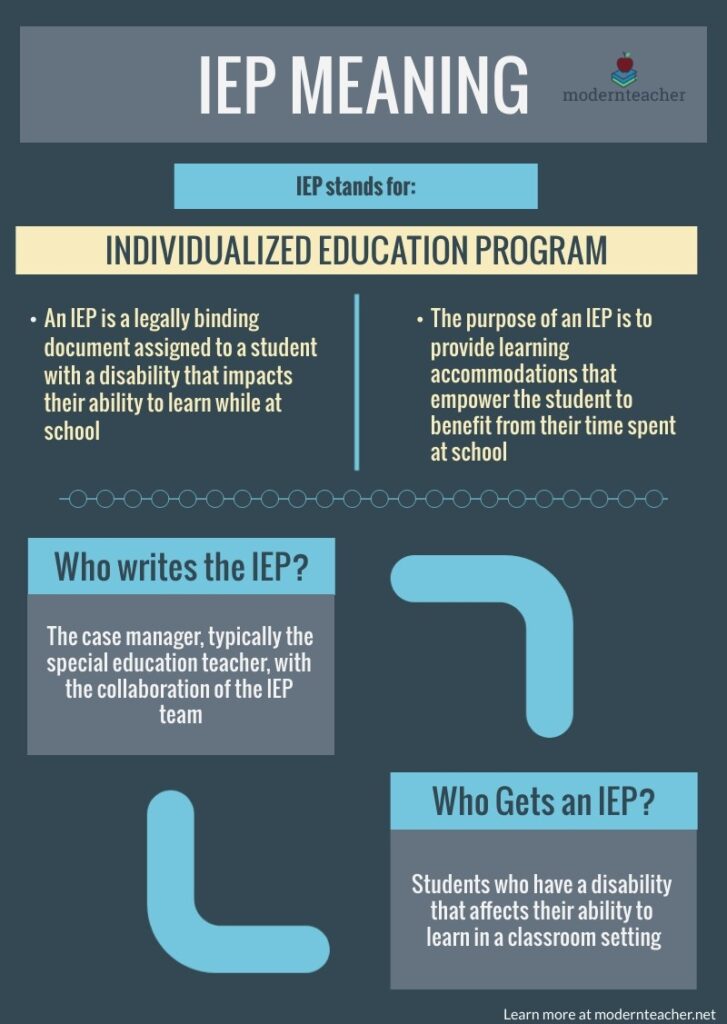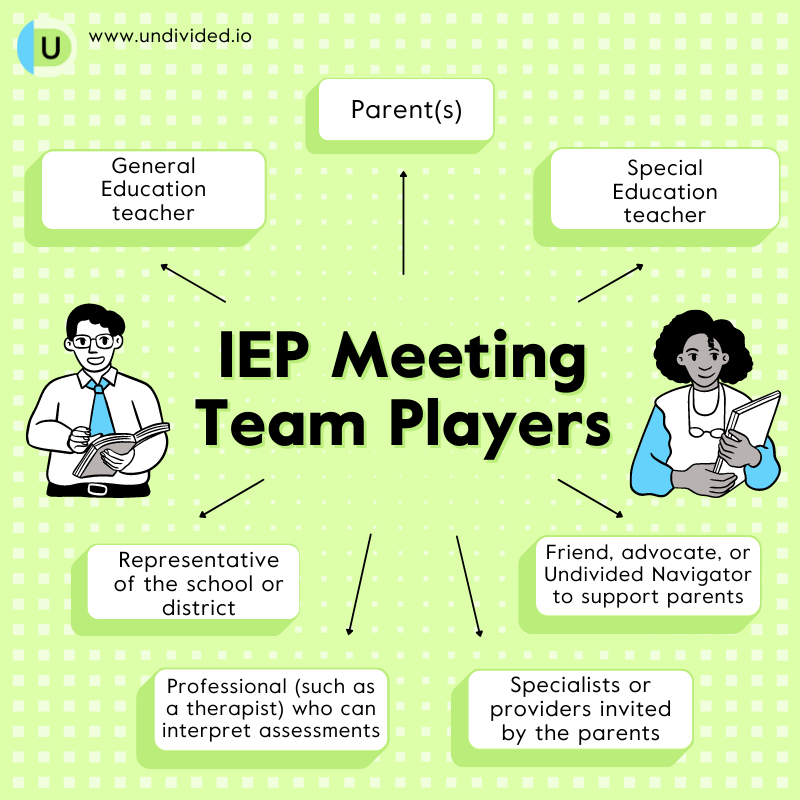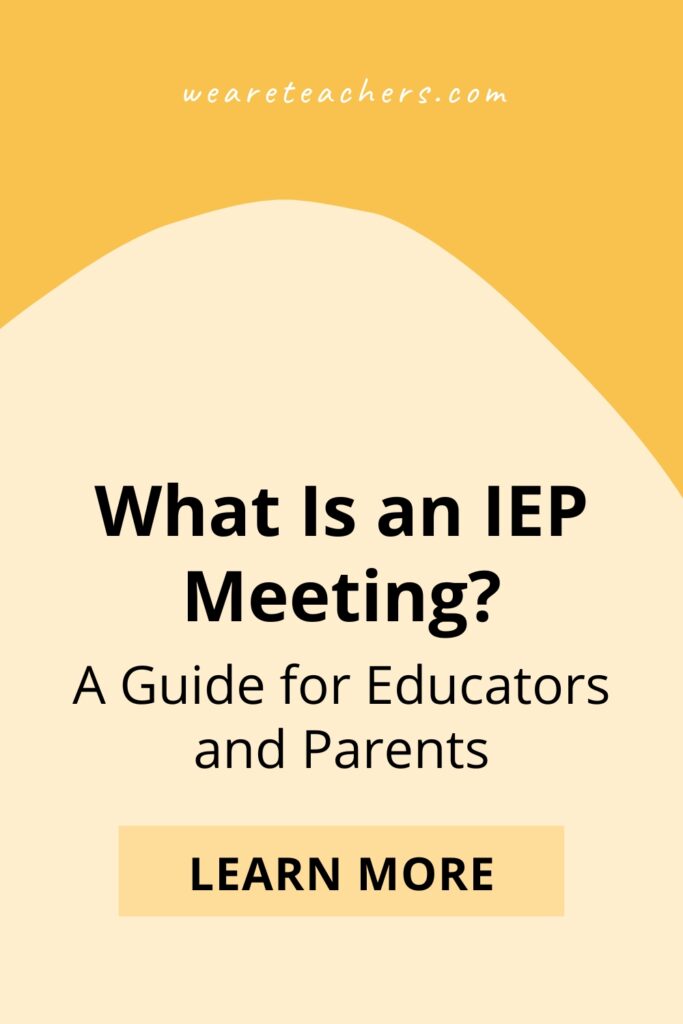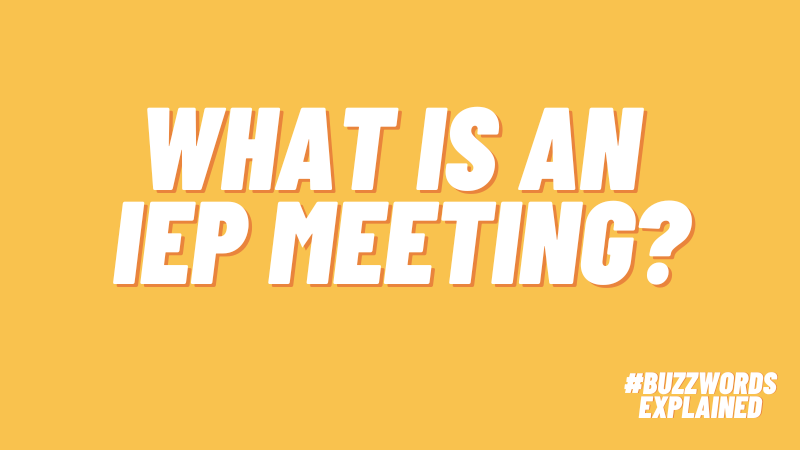An IEP meeting is when a student’s team comes together to create or update the student’s Individual Education Plan, or IEP. But it doesn’t stop there. Teams come together to talk about everything from referrals to discipline, and everyone around the table has an important role.
What is an IEP meeting?
An IEP meeting is held anytime that the child’s team needs to make a change to their IEP. Any team member—parent, teacher, therapist, even the student—can request an IEP meeting. Annual reviews must happen on a schedule, but many other meetings happen anytime a concern arises.

From: https://modernteacher.net/iep-meaning/
Source: Modern Teacher
What are the rules for an IEP meeting?
First, assume good intentions. Everyone is there to create a plan that works for the student. As in any meeting, it’s important to maintain professionalism, especially when people disagree. There are also rules on the paperwork side—each meeting has its own documents that need to be printed and signed. (Paperwork is typically handled by a case manager.)
After every IEP meeting, a Prior Written Notice is given to the parents. This is a summary of what the team agreed to at the meeting, and what the school will implement. The Prior Written Notice contains everything from updating the child’s goals to conducting a reevaluation.
It’s not a rule, but it’s important to consider that the IEP meeting can be overwhelming for parents. As a teacher, you may attend a handful in a year, or you may feel like you’ve attended a hundred meetings at least. For parents, this may be the only IEP meeting they attend each year, so it can be anxiety producing.
Who has to attend an IEP meeting?

Source: Unidivided.io
The IEP team includes:
- A district representative (called an LEA, or Local Education Authority)
- General education teacher
- Special education teacher
- Someone to review the evaluation results
- The parent(s)
The LEA or special education teacher and results person can be the same. But often the person who reviews the results will be a psychologist or therapist.
Other people who may be at a meeting, depending on which services a student receives, are:
- Speech therapist
- Occupational therapist
- Physical therapist
- Teacher’s aide
- Social worker
- Counselor
- Anyone else who provides services for the child
The child’s parents may bring an advocate or outside member to participate. For example, if a child receives ABA therapy outside of school, the family may bring in the ABA therapist to provide their opinion.
And if the child is receiving support from an outside agency, that agency may send a representative.
Finally, the student may attend the meeting. They are required to be invited once the team is planning their transition out of school (often age 14), but they may be invited before then if it’s appropriate.
Read more from the Department of Education.
What are the types of IEP meetings?
IEP meetings cover everything from whether or not a child is eligible for special education services to reevaluation and discipline.
Referral
Happens: When a school, teacher, or parent suspects a child has a disability
Purpose: This is the first meeting for a child, so the team reviews the processes and procedures, and completes a referral. At this point, the team can decide to move forward with an evaluation if they suspect that the child has a disability. There are 14 disability categories under IDEA that qualify a student for special education:
- Autism
- Deaf-blindness
- Deafness
- Developmental delay
- Hearing impairment
- Emotional disability
- Intellectual disability
- Multiple disabilities
- Orthopedic impairment
- Other health impairment
- Specific learning disability
- Speech or language impairment
- Traumatic brain injury
- Visual impairment (blindness)
The team can also decide not to move forward if they think additional interventions are needed or there is another reason that a disability is not suspected. For example, if a child was referred for an evaluation for a learning disability but has been absent a lot, the team may not advance the evaluation until the student has been in school consistently. Lack of attendance has to be ruled out as a cause for a disability.
Initial Eligibility
Happens: After a child’s evaluation is completed
Purpose: In this meeting, the team will review the results of the evaluations and explain whether or not the child is eligible for special education services. In order to be eligible, the child must have a disability that has an “adverse effect” on their education. If they are eligible, then the team will write the IEP. If they are not eligible, then the team may suggest a 504 plan or other interventions in the school setting.
Sometimes conversations about eligibility are straightforward, other times the team might have a longer conversation about where to determine eligibility. For example, if a child has a diagnosis of ADHD but is also eligible under a learning disability, the team may talk through the disability category that is most significant. The ultimate goal is to determine the area of eligibility that is most appropriate for their educational needs.
Read more: What Is a 504 plan?
Annual Review
Happens: Every year around the same time
Purpose: In this meeting, the child’s present levels of functioning, goals, service time, and accommodations are updated. The team will also review the assessments the child is taking in the next year and make sure testing accommodations are up-to-date.
Reevaluation
Happens: Every 3 years
Purpose: At this meeting, the team will decide whether or not to do a reevaluation. This may include testing (psychological testing, educational testing, speech and language or occupational therapy testing) to determine if the child is still eligible, and/or if they require changes to their IEP programming (like adding occupational therapy). A reevaluation meeting opens the reevaluation, and a results meeting includes a review of the results and changes to the IEP. The results meeting often doubles as the child’s annual review.
Addendum
Happens: Whenever a teacher, parent, or other team member requests it
Purpose: Anyone can make amendments to an IEP at any time. A parent may want to revisit a behavior goal, a teacher may want to revise reading goals, or a speech therapist may want to change service time. The IEP is a living document, so it can be adjusted at any time. Addendum meetings are often completed without the entire team, so they can be more streamlined.
Manifestation Determination
Happens: After a child who has an IEP has been suspended for 10 days
Purpose: A manifestation meeting determines whether or not the child’s behavior that resulted in suspension was a manifestation of their disability, and if so, what changes need to be made to their IEP.
Read more: PACER Center: How to Evaluate Meetings
What does the general education teacher do at an IEP meeting?
A gen ed teacher provides important information about how the student is doing in class and what is expected in their current grade.

Source: Medium
How can a general education teacher prepare for an IEP meeting?
Come to any IEP meeting prepared with:
- Strengths that you’ve seen in the child so you can share great things that are happening in school.
- Work samples to show where the child is academically, especially if you have samples that show growth over time.
- Classroom assessments. Be prepared to talk about how the child’s testing accommodations helped, and which they used or didn’t use.
- Academic data: information that shows the student’s progress throughout the year.
What if someone on the team can’t attend an IEP meting?
Every effort will be made to have all the team members in the meeting, but if someone needs to be excused, they can be. If a team member’s area of expertise is not going to be discussed or changed or if they provide information prior to the meeting, and if the parent and school consent in writing, then they may be excused. This applies only to the required team members (general ed teacher, special ed teacher, LEA, and interpreter of results).
If you have to leave in the middle of the IEP meeting, the leader will ask the parents if you have verbal permission to leave and that will be noted.
What happens if the team does not reach an agreement during the meeting?
An IEP meeting may be stopped because the team thinks it needs more information to make a decision. It may end because there is so much disagreement that an additional meeting needs to happen to allow everything to be completed.
What happens after the IEP meeting?
After the meeting, the IEP goes into effect as soon as possible (typically the next school day). So any changes to a child’s placement, goals, accommodations or anything else should be implemented the next day. As a general education teacher, you should have access to the updated IEP, be informed of your responsibilities, and be informed of what accommodations, modifications, and supports are provided to the child.
What are parents’ rights at a meeting?
Each state has a handbook that outlines parents’ rights, but it’s a good idea to be familiar with it from the school side too. Some important rights:
Parents can call a meeting whenever they feel the need. They may call a meeting because they are seeing an increase in behaviors, or because their child does not seem to be making progress and they want to adjust the goals or service time.
Parents can invite anyone they’d like for support. That could be someone who is familiar with their child’s disability, an advocate who knows the system and laws, an outside provider, or a friend.
Parents’ ideas should be welcomed and seriously considered. Often parents are doing things at home that could be helpful in the school setting, especially when considering the child’s preferences.
Read more from Iris Center at Vanderbilt University.
IEP Meeting Resources
The Wrightslaw blog is the definitive place to go to research special education law.
Read more about IEPs before your next meeting: What is an IEP?
Have questions about IEP meetings or stories to share? Join the WeAreTeachers HELPLINE group on Facebook to exchange ideas and ask for advice!


